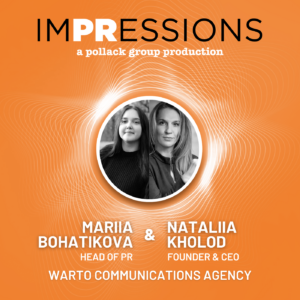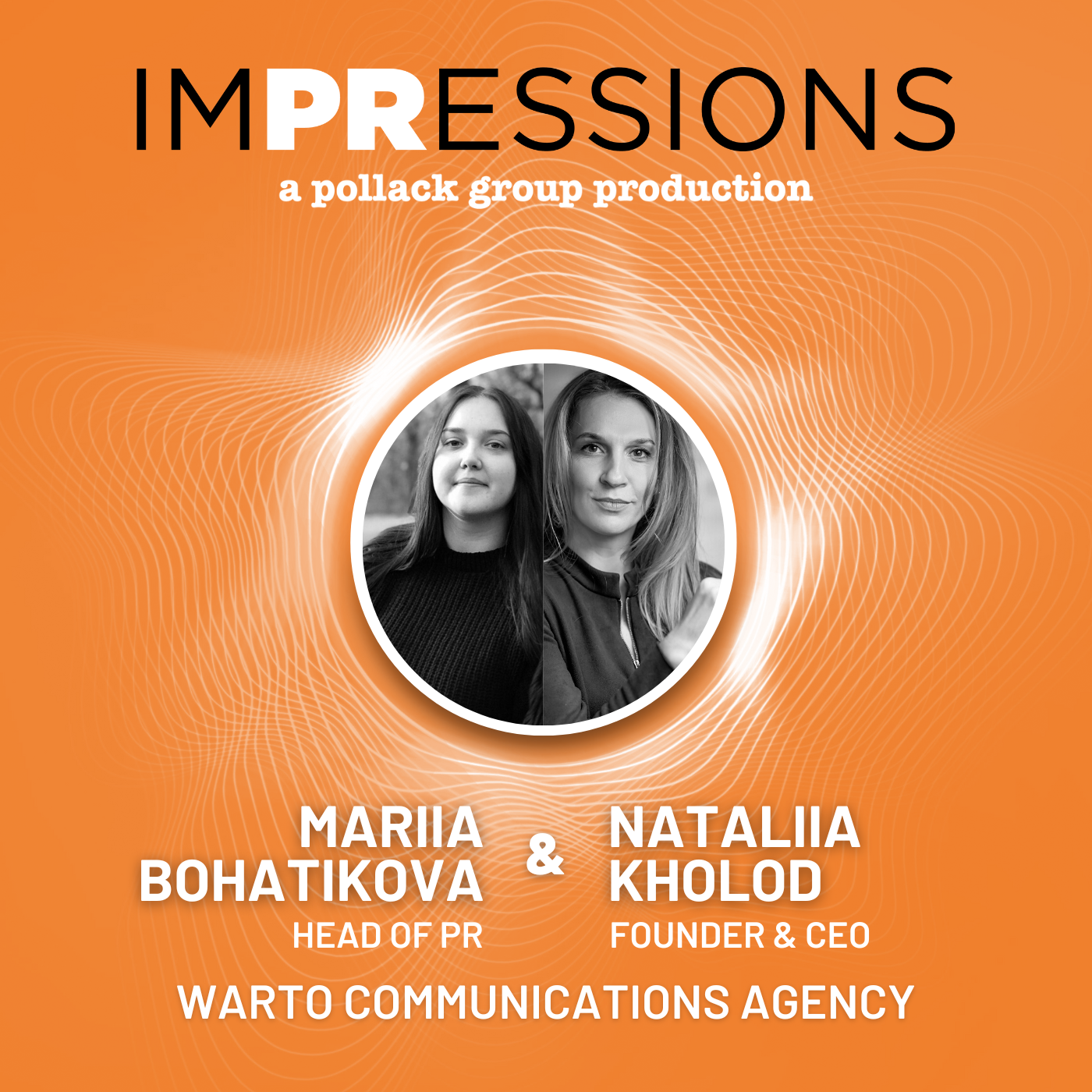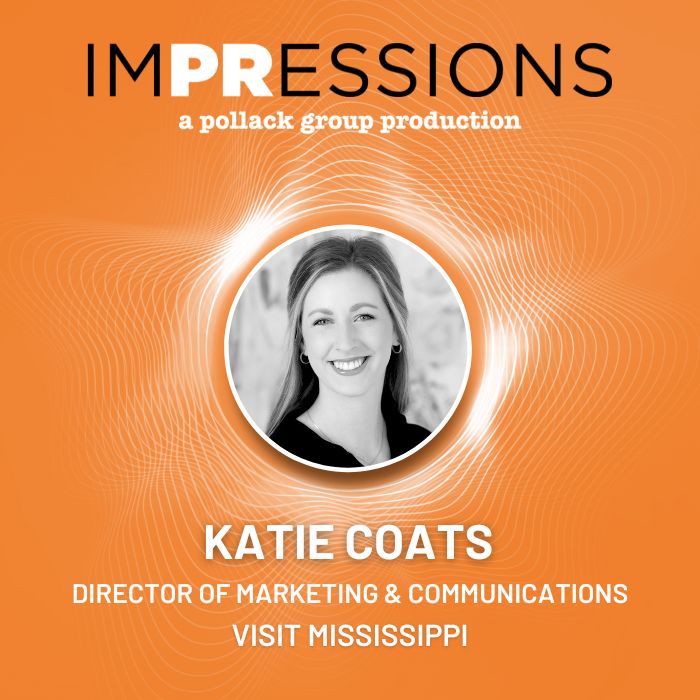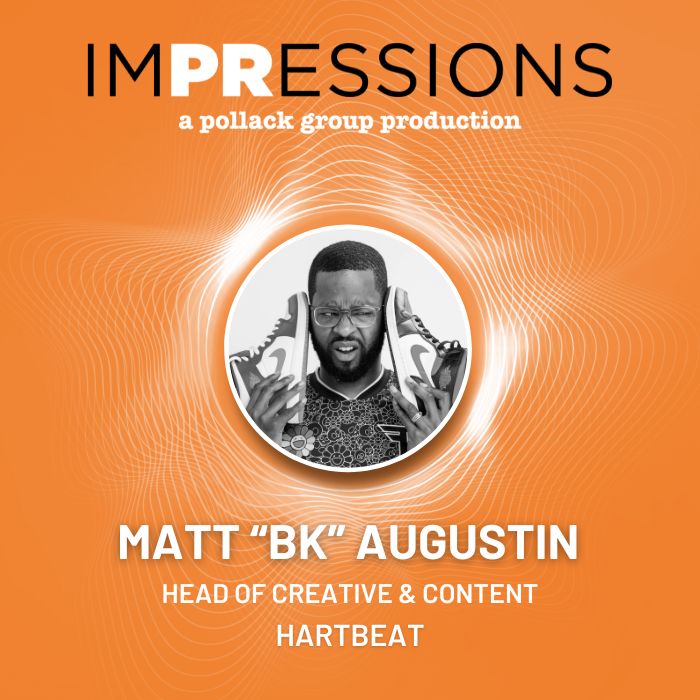 Within the last few years, the world has experienced many hardships. From a global pandemic to a volatile US election, many of us have faced tremendous distress, but despite our own challenges, no one has been hit harder than the people of Ukraine. On February 24, 2022, the lives of Ukrainian citizens changed forever as their country experienced a full-on invasion, and civilians have been living through the devastating war ever since. However, many professionals will tell you that despite the uncertainty of times, the work continues when it comes to PR and marketing. Episode 9 welcomes Mariia Bohatikova and Nataliia Kholod, from Warto Communications, a PR and marketing agency based in Ukraine. Today’s powerful conversation details how PR changes the way we experience disaster.
Within the last few years, the world has experienced many hardships. From a global pandemic to a volatile US election, many of us have faced tremendous distress, but despite our own challenges, no one has been hit harder than the people of Ukraine. On February 24, 2022, the lives of Ukrainian citizens changed forever as their country experienced a full-on invasion, and civilians have been living through the devastating war ever since. However, many professionals will tell you that despite the uncertainty of times, the work continues when it comes to PR and marketing. Episode 9 welcomes Mariia Bohatikova and Nataliia Kholod, from Warto Communications, a PR and marketing agency based in Ukraine. Today’s powerful conversation details how PR changes the way we experience disaster.
Impressions Episode #9 Transcript
Jenn: The world changed in early 2020 with the rise of Covid 19, a vicious virus that would leave no life unchanged as businesses and society worked feverishly to combat the devastation of a global pandemic. Since then, the world has experienced dramatic elections, inflation, the threat of climate change and war. Today, we are honored to speak with Nataliia Kholod, CEO and owner of WARTO Communications Agency, and Mariia Bohatikova, head of PR at WARTO Communications based in Kiev, Ukraine. Today, we will discuss the severe impacts of disaster and how PR professionals cope in times of turmoil. Hi, Maria and Natalia, how are you today?
Mariia: I believe we are absolutely perfect today, like as it may be.
Jenn: That’s great to hear. Thank you so much for joining us.
Nataliia: Thank you for the invitation.
Kalli: Of course. Of course. So on February 24th, 2022, the lives of Ukrainian citizens changed forever as Russian soldiers invaded your country. On our introductory call, you mentioned to Jenn and myself that you and your team kept working. What do you remember about that day?
Mariia: Frankly speaking, today, almost 14 months later, it is very difficult to reflect back to that time to February 24th, 2022, because on the one hand, the lives of all our people, all Ukrainians, were clearly divided into before and war. And on the other hand, despite this division, the whole year was full of different events, the term sustainability and individuality, bravery. You may continue this line with different sentiments, but to think about it this day feels very strange and reflect to that day. It feels very strange, but we will try.
So foreign movies and war in reality are completely opposite concepts. And the first days was very scary. We were staying in Kiev thinking about how to organize our work, and then the war began. The full-scale armed invasion began. And we don’t know. We don’t know- we don’t supposed to have this situation and no one was actually ready for what they actually saw. Even those people who believed in the possibility of this invasion, they did not expect exactly how it would move, for example, the attempt to seize Kiev. Now, it seems very absurd, but it looks like that before. It seems absurd before. But I currently don’t know a single person who would just stay still even on that day.
And our agency also was not staying still. We started to move. Our people started to change their locations for more safe places. And then we continued to work. And actually our CEO, Nataliia, she reminded us that we need to continue to support our country and our people doing those things which are perfectly for us. She even told us that she knows that she is not a good sniper at war, but she is a good sniper in communications, and that’s why we continue to work. And we provided social responsibility program for businesses to support their communications. We help businesses to adapt their communications to military realities. We continue to look through the news and check news and adapt communications to the situation. And during the first 55 days of the war, our agency helped 24 Ukrainian and international brands represented in Ukraine to revive their communications, and then the situation became more stable and changed due to different reasons due to massive attacks and something like that. But for that moment, the work was very important just to continue to work.
[Nataliia Speaks in Ukrainian]Mariia Translates: So the most hard and scary was to confirm that the war is really began and it looks more scary than it was in cinemas. and films Climate
[Nataliia Speaks in Ukrainian]Mariia Translates: When we heard that notifications from our partners, from our politics, from our partners, from America, we don’t think that it will be tanks on the streets. We think it will be some kind of debate format with informational war and some other activities, but not particularly tanks on the streets.
[Nataliia Speaks in Ukrainian]Mariia Translates: So for Nataliia, the most difficult thing was to confirm and accept that planning is not possible in such circumstances.
[Nataliia Speaks in Ukrainian]Mariia Translates: We needed to save our team from any kind of panic and to keep our clients because they are very big enterprises and big companies. So they involve and have an impact on all the society in all our country and economy.
[Nataliia Speaks in Ukrainian]Mariia Translates: And nowadays, for the whole Ukrainian business, the most difficult thing is planning for us is now only for one-three months. It’s possible now for only one-three months.
Jenn: Wow. That’s incredible, though, that you kept going and, you know, tried to keep the team moving ahead with everything. Very amazing.
[Nataliia Speaks in Ukrainian]Mariia Translates: We have a very important task now, if we speak about public relations and communications, it connected with the internal PR because it’s very important to work with teams and form teams and partners.
Jenn: Absolutely. So want to ask you a question kind of moving before the war. So, you know, Covid 19, of course, disrupted the communications and PR industries drastically. How did your agency combat the pandemic? How did your day-to-day life change? In the US of course, we didn’t really take protocols and it took a little bit of time for us to really understand the severity of what Covid 19 was. How did it impact Ukraine?
[Nataliia Speaks in Ukrainian]Mariia Translates: So, Natalia added that Ukrainian business nowadays is actively joking about, “Thank you Covid 19, You helped us to prepare to work in conditions to war and life routine.” We called it like that. So it’s war in life. Not only war, war in work life
[Nataliia Speaks in Ukrainian]Mariia Translates: Particularly our agency, started to adapt the work system to remote mode during pandemic. And it really helps to organize all processes for lots of Ukrainian businesses. And this experience was very useful to us and to our clients, to our colleagues, because we started work, remote, organize all our systems and technologies and communications. So it will be more like easy really. It was a preparation for something like a war situation.
[Nataliia Speaks in Ukrainian]Mariia Translates: So if we compare how our clients react during the Covid 19 and during the war, we need to say that especially in communication with public relations agencies and communication agencies, our clients return quickly during the work weekends, and it was during the pandemic. So now all businesses understand the role of public relations and communications for the victory, actually. And they start to actively communicate and support their connection with their audiences.
Kalli: That’s actually really interesting. Are there any trends that you’ve witnessed that have come out or things that have been adapted due to the pandemic? You know, obviously, you know, we’ve talked about how people’s lives changed, you know, how clients reacted to it, but are there any other like real trends that came out of it
Mariia: Many new trends connected with digitalization started to develop. Digitalization as a process has also become very powerful and active. It connected with the transformation of traditional media into digital media. It was started during the pandemic and then continued to develop in more new level during the war because we saw it as a trend during the first couple of weeks, during the full-scale invasion, we saw that people started to consume news and also information from telegram channels and communications for businesses. It started to be more interesting way to communicate and to share their news more effective way, actually. And as a trend also connected with the pandemic is the activation of cooperation with bloggers and influencers. So, they are the interest of their role in promoting different services and products has also grown as a trend.
[Nataliia Speaks in Ukrainian]Mariia Translates: And also during the pandemic for a budget optimization, big companies started to develop some collaboration projects. And it’s also very popular and usual trend and active trend. And if we speak about digitalization, we also see that our government and our country, our state reacts to it and continue to develop some new digital instruments and digitalize different services. For example, we have a government application called DIA, we called it the State in a smartphone, and it became a very cool and useful tool for people during the war. And other businesses also started to find some interesting solutions to organize their business. For example, mobile banking was also actively developed and continue to develop and like digitalization is the most popular trend. I believe it.
Jenn: Yeah, agree with that and think it’s a good thing about our industry that it can sort of roll with the changing tides of the world, of the communications in itself. So we’re lucky in that perspective to be able to work in an industry that can easily adapt. And what I found very interesting before that you said, was how Covid actually prepared you for the war. I find that very interesting that you were able to take something as terrible as a global pandemic, but really learn from the changes that came about. I’m curious, that right now the public perception of what is happening in Ukraine, a full on invasion and war, is portraying Ukraine as the underdog and eventual winner. As Ukrainians, what is your perspective on that?
Mariia: Of course, all Ukrainians believe that it will be the victory for Ukraine. We continue to do everything we can do on different levels to help our country and our defenders. Businesses continue to do business. People continue to support, to volunteer, to communicate about what’s going on in Ukraine, and our defenders continue to defend us. So absolutely, everyone believes that it will be a victory. Of course.
[Nataliia Speaks in Ukrainian]Mariia Translates: The notion that for our nation it’s very important to be independent, and Free.
Jenn: Yeah, absolutely.
[Nataliia Speaks in Ukrainian]Mariia Translates: We are ready to stay until the end for these reasons, because it’s like our gene, our code, national code.
[Nataliia Speaks in Ukrainian]Mariia Translates: Even our national emblem, it has a term “will liberty” in its symbol. So you can find the words.
Kalli: That’s really great. And so how does your agency plan to continue moving forward through the war? Are you kind of taking it day by day, or do you have long-term plans implemented to keep your clients and your workflow moving?
[Nataliia Speaks in Ukrainian]Mariia Translates: We continue to move forward. Not even massive attacks or blackouts can stop our agency, our work. We continue to communicate. We continue to work from shelters. We continue to work from subway stations. When it was some dangerous situation in the cities, we organize all processes to be done during different emergency situations.
[Nataliia Speaks in Ukrainian]Mariia Translates: As a leader, Nataliia directs our team that we are not surviving. We are moving forward and we are leaders in our niche in our sector now.
[Nataliia Speaks in Ukrainian]Mariia Translates: So from the point of financial results of the year, we succeeded to achieve the similar result as it was last year before the war. But before, for us, it was normal to double our profits incomes a little. We need to resolve that. For the war time it is normal result. In the beginning of the war we saw that half of Ukrainian agencies, communication agencies stopped their work and they just closed. Nowadays we see that our sector started to work again. A very good trend for us. Okay.
Jenn: Happy to hear that. Happy to hear that you’re still moving forward. We’re more than a year now since the war began. Where do you see Ukraine heading in the coming months? What do you think is next?
[Nataliia Speaks in Ukrainian]Mariia Translates: So all businesses that continue to work now believe that they are ready to continue to work in future, that these actions help to support the economy of Ukraine. Ukraine Businesses continue to develop partnerships with different international companies. We have a lot of requests from our companies to help them develop communications on international markets so they are ready to become international businesses. Of course, we hope that our partners, our international countries, governments, especially America, will continue to help us. And we are very grateful for the help because it’s really very great support for our country, our people. Our media, they are very grateful for it and they show that Ukrainian people are grateful for it and continue to produce news about all the support we have from another countries and other governments. We believe that this war is a common protection of independency for all independent countries. And that’s why we believe in the support of our country and the victory.
Jenn: Absolutely, absolutely. Supporting your independence supports everybody’s independence. And that’s very important for us. And we’re very proud to be able to help support your country.
Nataliia: Thank you.
Jenn: With every year that passes and every season that comes to an end, one thing remains constant. Communications will always be an integral part of facing disaster. Thank you so much for your time today, Mariia and Nataliia. We are keeping you, your PR firm and the country of Ukraine in our hearts and appreciate you sharing your story of resilience with us today. For those listening, as always, email us anytime at imPRessions@pollackgroup.com. Till next time, Slava Ukraini.
Nataliia: Slava.
Mariia: Thank you.






